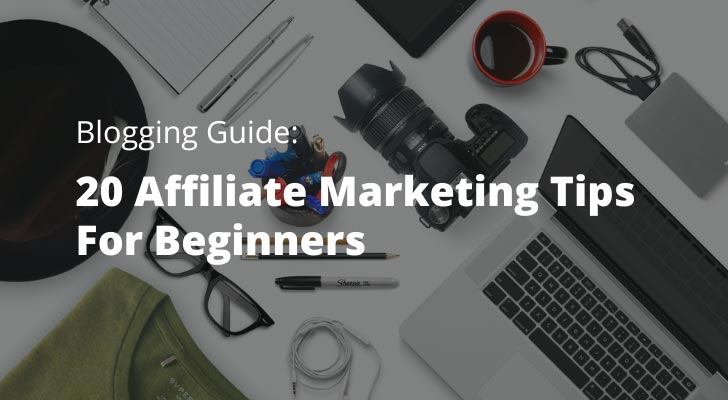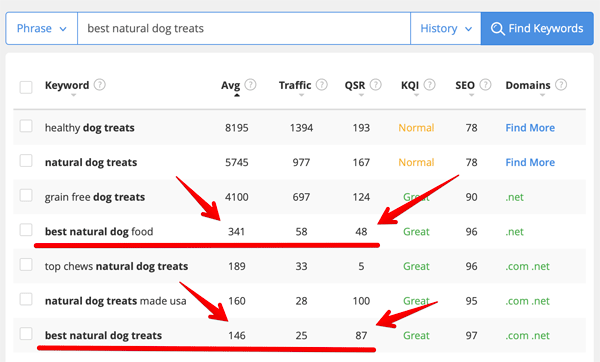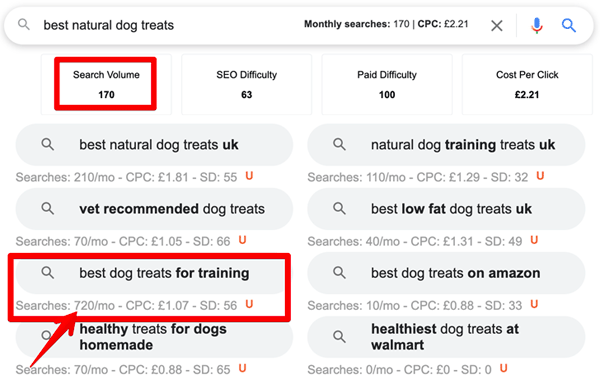The affiliate marketing industry has come a long way - well, I'm talking like I know it all, but I've only been around for less than a decade. Yet, I continue to find it full of surprises as I learn something new. Just like life (doh).
The trends may evolve, but some basics have not changed. Blogging remains a solid way to sell affiliate products even though it’s been some time since video marketing became the mainstream. So here is my version of 20 affiliate marketing tips for beginners to help you get good results and beyond. Keep reading.

1. Build A Budget
Over the years, I get a lot of messages from beginners who are on low or no budget and wish to “make money online” because they can’t find a job locally. In fact, I received another one this morning who told me exactly that.
Affiliate marketing is a very popular and lucrative business model, and one of the reasons is the low starting cost. Join Amazon Associates and promote products on Twitter, and you’re already in affiliate marketing. The problems are that you’re unlikely to make money this way (unless you have hundreds of thousands of followers already!) and that’s not a sustainable way because your social posts are so transient.
You are going to run a business. So you do need some money to invest to get it started, mostly in training and tools. The typical costs are;
- Website hosting (From $3-$20 per month per site)
- Website domain (Around $13-14 per month per .com domain)
- Affiliate marketing training (Up to $50 per month or so)
- Keyword research tool (Free - $30 per month)
- Email marketing tool (Free - $20 per month to start with)
So you don’t need a lot - that’s the good thing about affiliate marketing. You’ll probably need around $50-$100 per month including training, and the training can be stopped once you feel unnecessary.
If you are struggling to find money to invest, you can sell your skills on Fiverr to generate a supplemental income. You wouldn't want to take on high-risk loans such as credit cards or any refinancing option such as student loan refinance.
2. Choose Your Niche Carefully
Now, the importance of niche selection has been discussed by affiliate marketing experts over and over again for many years. (So you may be sick of hearing this! Then skip this section.) There is no one solid golden rule, so here are the points of consideration;
- Your niche must be something you’ve been passionate about for a while. Don’t just choose one that you ‘think’ you are interested in - you’ll get bored sooner or later.
- 4 best-selling niches; health/beauty, wealth, self-development, and love/relationship. They sell well once your affiliate marketing site is established, but until then, very competitive because we all try one of these best 4.
- Don’t be tempted by luxury niches (e.g. yacht hire, villa holidays.) Their unit prices are high, hence your commission rates will be high. But the truth is, your word of recommendation won’t be credible unless you actually use them regularly and know the industry well.
If you feel overwhelmed by the types of niches, this guide may help you: 180 Best Affiliate Marketing Niches
3. Start Building a Simple Affiliate Website
If you haven’t created your first website just yet, the preparation process may seem daunting to you. Deciding the domain name, choosing a web hosting company…
Did you know you can actually build your site first, and start publishing blog posts - as many as you wish - using a subdomain for free? Whenever you feel ready, you can buy a domain name, have it hosted by a company of your choice, and migrate the entire site to your own domain.
Check the step-by-step on this page: How To Create A Website For Affiliate Marketing. It will help you start creating your affiliate blog posts right away.
4. Learn SEO Best Practices
You know what, everyone talks about Search Engine Optimization and how important to follow SEO best practices, but learning is not as difficult as it may seem to you.
It’s about optimizing your page in order to be approved by search engines. Installing an SEO plugin is a must because it will set out the foundation for you such as;
- Create a sitemap so search engines can crawl your pages.
- Automatically create a meta description (unless you manually type in) each time you publish a page.
- It will give you an option to disallow search engines to crawl your page with one click.
Yoast SEO and AIOSEO are two of the most popular plugins.
Other SEO techniques should be applied before you publish your post each time, such as using the right keywords, optimizing (resizing) images, placing internal links, etc. I’ll talk about these in a little while, but the skills will become second nature to you, believe me.
What Do You Advocate?
5. Become Keyword-Conscious
No matter how good your writing skill may be, if you don’t know which keyphrases ‘sell’, your blog articles will be buried in SERP (Search Engine Results Pages) and be wasted. You do need to be keyword-conscious when you create an affiliate marketing page. In fact, you should find the right key phrase first, then start constructing your page around the phrase.
The skill is not difficult to master. You need a keyword search tool to find out is which keyword (phrase) is most suitable for your blog post, i.e.
- Searched by “many people” per month AND
- Less competitive.
So how many is “many people”? It depends. I’ll give you an example.
You definitely need to use one, preferably two tools because they often come up with different results. The two tools I use are;
- Jaaxy - To find out the average number of searches per month, and the number of competing websites ranked on Google. Plus other keyword suggestions.
- Ubersuggest - Also to find out the average number of searches per month, plus other keyword suggestions.
For example, if you search for the phrase "best natural dog treats" on Jaaxy, it tells you that the phrase is searched 146 times per month, and there are currently 87 competing sites are ranked on Google.

Jaaxy result
Jaaxy also tells you that the phrase "best natural dog food" is better, because the phrase is searched 341 times per month, and there are 48 competing sites. It means "best natural dog food" is searched by more people and less competitive.

Ubersuggest result
Whereas on Ubersuggest, the same phrase "best natural dog treats" is searched 170 times per month. But it suggests that the phrase "best dog treats for training" is better because it's searched 720 times per month.
But Ubersuggest doesn't tell you how many competing sites there are on Google, so I go back to Jaaxy to check that.
I hope this makes sense - you get more refined results by using two (or more) keyword research tools to get the most suitable keyword every time you write a blog post.
6. Two Legal Pages That You Must Have
You’re monetising your website as an affiliate marketer, so you need to create two important legal pages.
- Privacy Policy to declare the information you are collecting including your cookie policy.
- Affiliate Disclosure to disclose that you may receive financial rewards for promoting other people’s products/services as an affiliate.
You need to have these pages to protect yourself from lawsuits, and make the pages accessible from your page by placing a link to each page, typically in the footer area.
No, you don’t have to create these pages yourself. You can google to find plenty of standard templates that you can download for free. I’ve got the templates for you on this page if you want to use them.
There’s no reason why Privacy Policy and Affiliate Disclosure should be displayed separately on two separate pages. As long as the titles should be clear since they are legally required - “Privacy Policy and Affiliate Disclosure”.
You’re not selling anything yourself (taking money directly from customers), so a Terms and Conditions page is not required.
7. Find Your "Audience"?
Have you ever heard marketing experts say “target the right audience” but you don’t understand how?
It’s easy for them to say but they don’t always clarify…well, two things. First, how do you find the “right audience”, and second, how do you target them?
One thing you can do to find your audience is to leverage niche-relevant Facebook groups.
- Create a fan page to promote your niche and promote your content website.
- Join discussions in the group and make yourself known.
- Ask the group members to like your page.
For example, if your affiliate niche is healthy dog treats, search for dog/pet-related Facebook groups - there are thousands of them, so refine the search by other keywords such as “dog health”, “puppy training”, etc.
Join some of the generic discussion groups and join the conversations - don’t just start promoting your affiliate business or asking them for any favour. That’ll just annoy them because nobody in any of the groups is there to help you, but you are the one who should be helping them eventually.
Next, as you skim through the conversations, you’ll start to form the idea of how you can “target” your audience - by finding out what people may be looking for.
8. Find What People Need
With the same example of the Facebook group and healthy dog treat niche… Your job as an affiliate marketer is to help people solve their problems by recommending methods and products. Try to figure out what they might be willing to spend money on to make their life easier.
You find them talking about their puppy’s teething/chewing problems.
Then go back to your website and write an advisory article, where you can also recommend hard chews such as Yak Milk or deer horns.?
Post your website update to your Facebook fan page.
Come back to the group thread, tell them about your article that you think will help them.
This is just an example. You can do similar exercises on Twitter. Quora is also a great place to find your audience and give them advice with your article. Understanding what people need is the key to success here.
9. Don’t Promote Seasonal “Trash”
I have seen a lot of digital product sellers who give a little tweak to the same low-quality product, change the name and sell it as new over and over again. They’re not looking to build a reputation, they’re just looking to keep targeting the new audience for short-term profits. It means you’re not going to build your reputation either if you keep promoting such products.
In other words, choose your affiliate products wisely. Remember, it’s important to put yourself in the buyers’ shoes. If you think the quality of a product is poor, don’t promote it even if it offers a good commission rate!
10. Show Your True Color
Ok, this may sound cocky and corny but listen. You are what you represent to your future audience. So stay as you are, and be honest and helpful to the other members of the group. This way, people in the same frame of mind will come and find you and find trust in you. Don’t try to be someone that you’re not, because pretending can backfire on you later, you see.
11. Ask The Experts

I’m not saying “go and find someone” - I’m not that useless, you know!
Currently, I’m having a hard time learning about particular crypto tokens. There’s not enough support and there’s no paid training course for it. Not understanding it is no one else’s business but mine. I seem to spend days trying to learn it all.
This reminds me that we don’t have such a problem with affiliate marketing. The community I belong to has a 24/7 live chat as well as a question post facility. So if you have a quick question, use the live chat to get instant advice from experts. If your question is complicated, you can write and post it. Experts will give you advice by leaving comments. It’s totally newbie friendly, so no question is stupid. You do need a place like that to learn the basic affiliate marketing how-to's. (Join me from here.)
Having the ability to conduct your own research and staying proactive is important. But it’s also important not to be afraid to interact with experts and ask them for advice. That’s how you learn!
12. Get In Touch With Affiliate Managers
Affiliate managers are there to give you support as well as to monitor your activities. They like to communicate with you, listen to your feedback, and help you succeed.
They are humans, after all. If you’re not promoting your affiliate products and stay quiet, they may abruptly cancel your contract too.
Don’t be afraid to ask them for extra materials that you may need, for example;
- Access to a demo account
- Sample products
- Special discount code that you can give to your readers
- Permission to create your own banners
13. Don’t Sell!
“Go on! What are you waiting for?”
Well, I’m waiting for you to tell me the truth. I thought you were reviewing the product.
Don’t use lame phrases like those used by the 1970s car salespeople. Because you are not supposed to be selling. You’re supposed to provide practical information and your personal opinion.
Try to avoid any bombastic phrases too, such as “this groundbreaking product will synergize individuals in the future generation…” They don’t mean anything. Nobody wants to hear your smart-ass vocabulary. They only want to know what you really think of the product as a user.
14. Use Call To Action
When I said “don’t sell”, what I meant was, don’t behave like a seller. You’ve got to sell to make money, so what’s the solution?
Use call-to-action (CTA) wisely.

Call To Action Examples
As the name suggests, call-to-action prompts users to take action - buy your affiliate product, sign up with your newsletter, grab a freebie, join a webinar, etc. Needless to say, it’s much more effective than telling something in normal text with a hyperlink (like, “If you are interested, click here.”)
I strongly recommend you to use a visual page builder Thrive Architect because it has good CTA templates.
15. Make Your Content Visually Appealing
There’s no doubt that the images you place on your webpage will make the content visually appealing and easier to read. But you probably know that copyright laws are protecting the owner of each photograph. There are royalty-free image sites that allow you to download photos and illustrations for free.
16. Get Valuable Comments
Comments from readers will add value to your content, but ONLY if they are of a certain quality. Quality comments will add two following benefits to your blog posts;
- Comments from readers are also content, written by other people, which means the extra value from different perspectives will be added to your page.
- People are commenting, which will show search engines that your page has useful, engaging value.
For these two reasons, comments will help boost your ranking position.
So how can you get comments from readers? There are two ways;
- Ask your social followers to visit your site, read the content and leave a comment. You can offer incentives, such as giving a free PLR digital product in exchange for leaving a comment that contains, say, 100 words or longer.
- Join Wealthy Affiliate - the community has a site comment scheme, where the members leave a comment on each other’s site. The system will automatically disapprove a comment that’s not unique and meaningful and prompts the commenter to rewrite it. So this scheme ensures that you build engaging comments on your posts.
My advice is that, make sure to reply to each comment. Because you may receive negative comments or one-liners, no-quality comments such as “Great info! Thanks!” For negative comments, you can challenge them politely and start a discussion. For no-quality comments, you can still add value with your meaningful response.
17. Delete Spam Comments
On the other hand, spam comments should be deleted from your post. If you use a content management system (i.e. website builder such as WordPress), each comment should be approved by you by default.
Spammers leave comments for malicious backlinking purposes, and they’re likely to copy and paste the same sentences on multiple websites. Copied content would harm your search engine ranking. A spam-shield plugin can block such unwanted comments automatically.
18. Don’t Rely On Ad Exchange

Ad exchange, or traffic exchange - there are numerous community sites where you can exchange your business information with others who work from home entrepreneurs.
LeadsLeap is one of the popular sites because not only does it let you advertise your affiliate marketing business to others, but it also provides useful tools such as a link tracker and funnel builder.
The problem with these ad exchange sites is that everyone’s trying to promote their own business to other members randomly, who are also trying to promote their businesses. They’re targeting the wrong audiences. These sites are good for ‘exchanging’ information with others, but barely anything more. Don’t rely on ad exchange sites to make decent money.
19. Use Autoresponder
Email marketing is key to keeping your audience interested, getting them to become repeat visitors to your site, hence you’ll have more opportunities to make affiliate income.
Every email marketing service provides lead generation templates (“Subscribe to our newsletter” form) but I personally recommend you to use Thrive Architect too, because it has more eye-catching templates.
An autoresponder allows you to automatically send sequenced emails to everyone who signs up with you at an interval between each email. So you don’t have to write emails continually.
The one thing you need to know - the majority of email marketing services prohibit you from promoting affiliate products. I would recommend either AWeber or GetResponse because they both allow affiliates, and the prices are reasonable (From free - $20 to start with.)
20. Be Patient!
You may have seen enough “make money online” schemes that claim to make hundreds of dollars “in the next 24 hours” for you, or “$1,000 a day”, etc.
They’re all misleading, if not scams, you know. Yes, newbies can make $1,000 by the end of the week if they spend $2,000 on traffic each day.
Affiliate marketing takes time before it starts to take off. Nothing happens overnight. But it will happen if you keep blogging, keep building trust, be persistent, be patient, and never give up.
Blogging Guide: 20 Affiliate Marketing Tips For Beginners
I hope the tips will help you succeed in your new affiliate marketing business. What did you find most interesting? Are there any points you are unclear about or disagree with? Feel free to comment below with your thoughts.



Hi, thank you for your blogging guide. It’s been a while since I updated my own blog and because the technology and Google algorithm changes continuously I was feeling lost lately. I read your blogging gide and it makes me more confident to restart affiliate marketing again. I didn’t even have legal pages and I just looked at your templates and I thought they were very helpful. Thank you Ray.
Hi Hitesh, thanks for your comment. I’m glad to hear that the templates were of use. If you need any help don’t hesitate to let me know at any time. I wish you all the best!
I must congratulate you for providing such an informative article to readers. The quality is impressive, but you hardly mentioned about how to sell products. Your points are all important but if you don’t have selling techniques, you will not make much money.
Hi, appreciate your comment. I believe that points 10 & 13 are “selling” techniques. Are you talking about copywriting? Then as you know there’s no magic there. Would you be able to explain it in a few paragraphs?
Thanks for your advice. Particularly about using 2 keyword tools to me is eye opening.
But I’m not sure about contacting affiliate managers. I’ve never seen any truly experienced managers, all they want is to make more money. Sometimes I wish they didn’t contact me. They don’t even provide free access to affiliates. What do you do you can’t make money but they are not willing to help?
Hi Ted, I see your point. Yes some affiliate managers may appear annoying to you but I guess they may be under pressure, and they can only prioritise affiliates who raise good revenue for them. They should still be helpful though if you ask them nicely! Thanks for your comment.